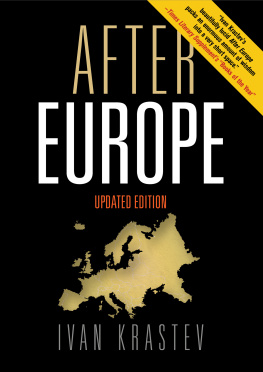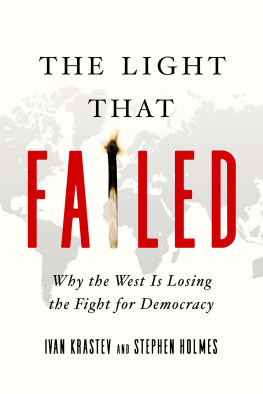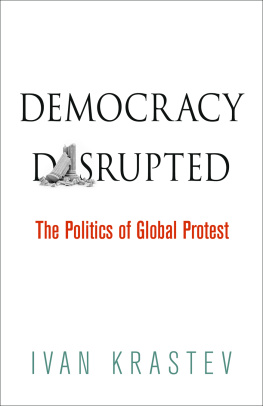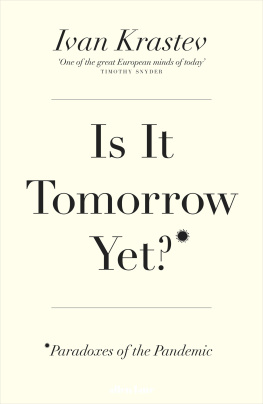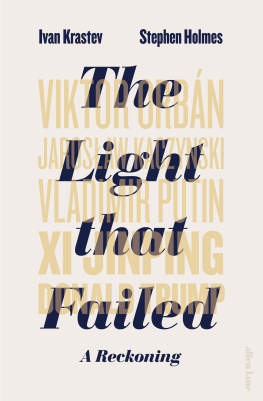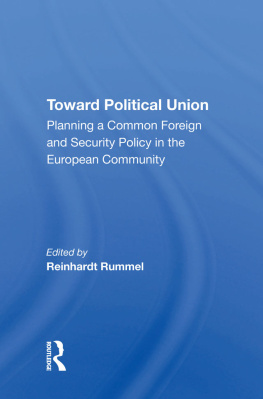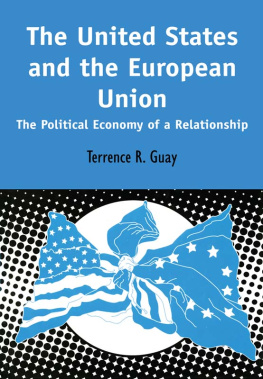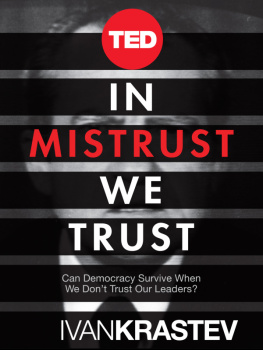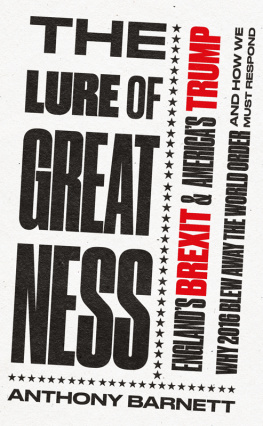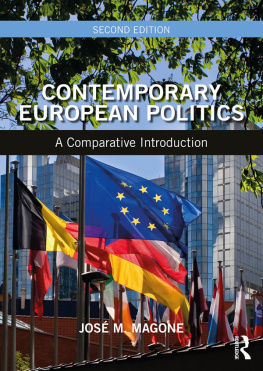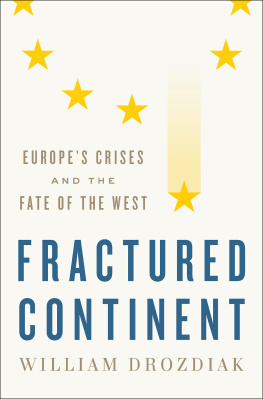Contents
Page List
Guide
After Europe
After Europe
Updated Edition
Ivan Krastev
PENN
UNIVERSITY OF PENNSYLVANIA PRESS
PHILADELPHIA
Copyright 2020 University of Pennsylvania Press
All rights reserved. Except for brief quotations used for purposes of review or scholarly citation, none of this book may be reproduced in any form by any means without written permission from the publisher.
Published by
University of Pennsylvania Press
Philadelphia, Pennsylvania 19104-4112
www.upenn.edu/pennpress
Printed in the United States of America
A Cataloging-in-Publication record is available from the Library of Congress
Cover design by John Hubbard
ISBN 978-0-8122-5242-2 updated edition
ISBN 978-0-8122-9753-9 ebook
Contents
Introduction
The Dj Vu Mind-Set
On one of the last days of June 1914, a telegram arrived in a remote garrison town on the border of the Habsburg Empire. The telegram consisted of a single sentence printed in capital letters: HEIR TO THE THRONE RUMORED ASSASSINATED IN SARAJEVO. In a moment of disbelief, one of the emperors officers, Count Battyanyi, began inexplicably speaking in his native Hungarian to his compatriots about the death of Archduke Franz Ferdinand, a man who had been perceived as partial to the Slavs. Lieutenant Jelacich, a Slovene who felt uneasy about Hungariansespecially because of their suspected disloyalty to the throneinsisted that the conversation be held in the more customary German. Then I will say it in German, Count Battyanyi assented. We are in agreement, my countrymen and I: We can be glad the bastard is gone.
This was the end of the multiethnic Habsburg Empireat least the way Joseph Roth captured it in his magisterial novel The Radetzky March.
As we know, the experiment never came to a definitive conclusion, because Europe failed to resolve its thorniest problem. Roths story is a powerful testament that when man-made worlds of political and cultural artifice disappear, they do so quickly. The end is both a natural outcome of structural deficiencies and the equivalent of a traffic accidentan unintended consequence, say, or an act of sleepwalking, a particular moment that has a dynamic all of its own. It is both inevitable and inadvertent.
Are we experiencing a similar disintegration moment in Europe today? Do both Britains democratic decision to leave the union (in economic terms, it is the equivalent of the egress of twenty smaller EU member countries) and the rise of Euroskeptic parties on the continent signal the unraveling of our latter-day experiment in resolving Europes most fundamental problem? Is the European Union doomed to fall apart in the fashion of the Habsburg Empire? Is 2017marked by critical elections in the Netherlands, France, and Germanyfated to be as momentous a year as 1917?
Jan Zielonka has aptly observed that we have many theories of European integration, but practically none of European disintegration. This is not accidental. The architects of the European project have fooled themselves into believing that avoiding mentioning the D word is a surefire way to prevent it from happening. For them, European integration was like a speed trainnever stop and never look back. Making the European Unions disintegration unthinkable was the preferred strategy over making integration irreversible. But there are two other reasons for the dearth of theories on disintegration. First is the problem of definition: How can disintegration be distinguished from reform or reconfiguration of the union? Would the departure of a group of countries from the eurozone, or from the union itself, amount to disintegration? Or would the decline of the EUs global influence and the reversal of some major achievements of European integration (such as the free movement of people or the abolition of institutions like the Court of Justice of the European Union) be evidence of disintegration? Does the emergence of a two-tier EU amount to disintegration, or is it just a step toward a closer and more perfect union? Might it be possible for a union populated by illiberal democracies to continue the same political project?
Then theres the irony that at the very moment when political leaders and the general public are paralyzed by a fear of disintegration, Europe is more integrated than ever before. The financial crisis made the idea of a banking union a reality. The need for an effective response to the rise in terrorist threats has compelled Europeans to cooperatemore than ever beforein the field of security. And what is most paradoxical, the multiple crises currently faced by the union make ordinary Germans unusually interested in the problems of the Greek and Italian economies and press Poles and Hungarians to be attentive to Germanys asylum policies. Europeans live in fear of disintegration while the union looks more than ever like a community of fate.
Imagining European disintegration has hardly been in vogue with fiction writers either. There are scores of novels that ask what would have happened if Nazi Germany had triumphed in World War II. We likewise have fantasies of what could have transpired if the Soviets had won the Cold Waror, for that matter, if the communist revolution had taken place in New York instead of Petrograd. But almost nobody has been particularly inspired to narrate the fictional story of the European Unions disintegration. The sole exception is, perhaps, Jos Saramago. In his novel, The Stone Raft, a river that flows from France to Spain disappears into the ground and the entire Iberian Peninsula breaks off from Europe and heads west across the Atlantic.
George Orwell was certainly right to suggest that to see what is in front of ones nose needs a constant struggle. On January 1, 1992, the world woke up to learn that the Soviet Union was no longer on the map. One of the worlds two superpowers had collapsed without a war, an alien invasion, or any other catastrophe, with the exception of one farcical, unsuccessful coup. The collapse happened contrary to every expectation that the Soviet empire was too big to fail, too stable to collapse, and too nuked-up to be defeated and had survived too much turbulence to simply implode. As late as 1990, a group of leading American experts insisted that sensationalist scenarios make for exciting reading but in the real world various stabilizers and retarding factors exist; societies frequently undergo crises, even grave and dangerous ones, but they seldom commit suicide. But in reality, societies sometimes do commit suicide, and they do it with a certain lan as well.
As it was a century ago, Europeans today are living at a moment when paralyzing uncertainty captures a societys imagination. It is a moment when political leaders and ordinary citizens alike are torn between hectic activity and fatalistic passivity, a moment when what was until now unthinkablethe disintegration of the unionbegins to be perceived as inevitable. And it is a moment when the narratives and assumptions that only yesterday guided our actions begin to seem not only outdated but nearly unintelligible. As we know from history, the fact that something appears absurd and irrational hardly means it cant happen. And the ever-present Central European nostalgia for the liberal Habsburgs is the best proof that sometimes we are able to appreciate something only after it is gone.
The European Union has always been an idea in search of a reality. But there is a growing worry that what once kept the union together no longer holds. Shared memories of the Second World War, for example, have faded from view: half of all fifteen- and sixteen-year-olds in German high schools dont even know that Hitler was a dictator, while a third believe that he protected human rights. As Timur Vermess 2011 satirical novel

